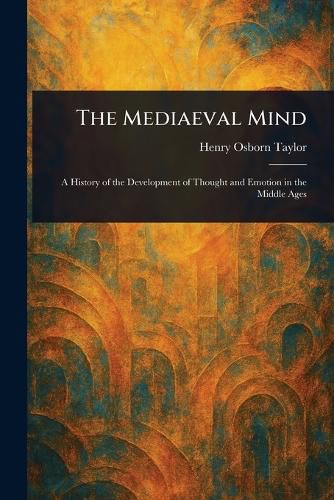Readings Newsletter
Become a Readings Member to make your shopping experience even easier.
Sign in or sign up for free!
You’re not far away from qualifying for FREE standard shipping within Australia
You’ve qualified for FREE standard shipping within Australia
The cart is loading…






This title is printed to order. This book may have been self-published. If so, we cannot guarantee the quality of the content. In the main most books will have gone through the editing process however some may not. We therefore suggest that you be aware of this before ordering this book. If in doubt check either the author or publisher’s details as we are unable to accept any returns unless they are faulty. Please contact us if you have any questions.
Delve into the intellectual landscape of the Middle Ages with Henry Osborn Taylor's "The Mediaeval Mind," Volume I of a two-part exploration. This meticulously researched history traces the development of thought and emotion during this pivotal period. A cornerstone of medieval philosophy and intellectual history, this volume provides a comprehensive survey of the era's defining ideas.
Explore the evolution of philosophical concepts and the shaping of European thought. Taylor illuminates the key figures and movements that defined the medieval period, offering insights into the prevailing intellectual climate. This volume is an essential resource for anyone interested in the history of ideas, the Middle Ages, or the foundations of Western thought. Rediscover the complexities and nuances of the medieval world through Taylor's classic work.
This work has been selected by scholars as being culturally important, and is part of the knowledge base of civilization as we know it.
This work is in the public domain in the United States of America, and possibly other nations. Within the United States, you may freely copy and distribute this work, as no entity (individual or corporate) has a copyright on the body of the work.
Scholars believe, and we concur, that this work is important enough to be preserved, reproduced, and made generally available to the public. We appreciate your support of the preservation process, and thank you for being an important part of keeping this knowledge alive and relevant.
$9.00 standard shipping within Australia
FREE standard shipping within Australia for orders over $100.00
Express & International shipping calculated at checkout
This title is printed to order. This book may have been self-published. If so, we cannot guarantee the quality of the content. In the main most books will have gone through the editing process however some may not. We therefore suggest that you be aware of this before ordering this book. If in doubt check either the author or publisher’s details as we are unable to accept any returns unless they are faulty. Please contact us if you have any questions.
Delve into the intellectual landscape of the Middle Ages with Henry Osborn Taylor's "The Mediaeval Mind," Volume I of a two-part exploration. This meticulously researched history traces the development of thought and emotion during this pivotal period. A cornerstone of medieval philosophy and intellectual history, this volume provides a comprehensive survey of the era's defining ideas.
Explore the evolution of philosophical concepts and the shaping of European thought. Taylor illuminates the key figures and movements that defined the medieval period, offering insights into the prevailing intellectual climate. This volume is an essential resource for anyone interested in the history of ideas, the Middle Ages, or the foundations of Western thought. Rediscover the complexities and nuances of the medieval world through Taylor's classic work.
This work has been selected by scholars as being culturally important, and is part of the knowledge base of civilization as we know it.
This work is in the public domain in the United States of America, and possibly other nations. Within the United States, you may freely copy and distribute this work, as no entity (individual or corporate) has a copyright on the body of the work.
Scholars believe, and we concur, that this work is important enough to be preserved, reproduced, and made generally available to the public. We appreciate your support of the preservation process, and thank you for being an important part of keeping this knowledge alive and relevant.